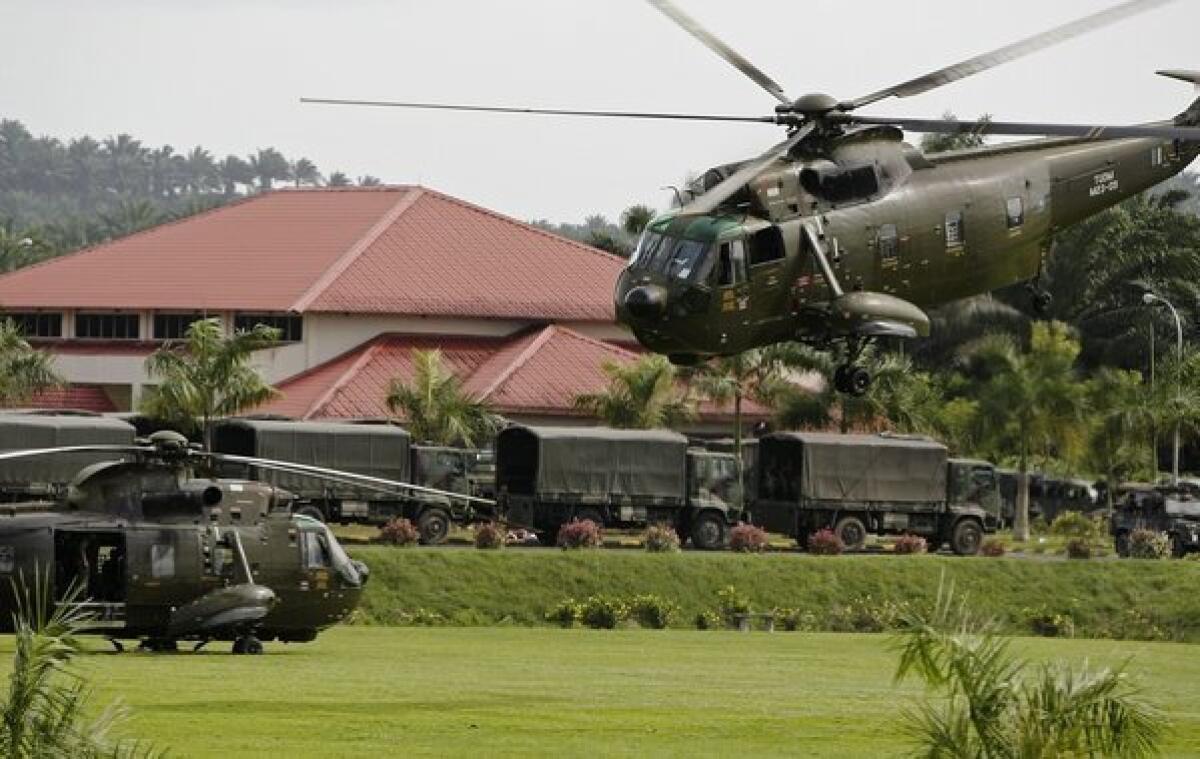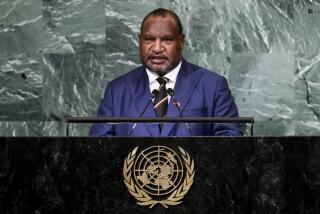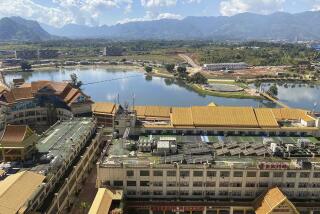Malaysian forces pound Filipino gunmen on Borneo

- Share via
NEW DELHI, India – Malaysian fighter jets and ground forces attacked an estimated 200 Filipino gunmen who are claiming a remote part of the island of Borneo after 27 died in earlier, unsuccessful efforts to dislodge them.
The Filipinos arrived in mid-February on the east coast of the Malaysian state of Sabah, which is on Borneo, demanding recognition for a sultanate that once ruled the area. They are believed to be hiding near a coastal palm-oil plantation.
“Our security forces were attacked and killed,” Malaysian Prime Minister Najib Razak said in a statement announcing Tuesday’s offensive. “The government has to take the right action in order to preserve the pride and sovereignty of this country.”
After the men landed, Malaysian authorities tried to persuade them to give up their quest and return peacefully to their home on the nearby southern Philippines islands. But that failed and the confrontation turned violent, leaving several Malaysian police officers and Filipino gunmen dead in recent days.
The intruders are seeking greater recognition for their clan and an increase in the $1,600 annual payment that Malaysia gives them in compensation for their ownership claim in Sabah, which was leased to the British by the sultanate over a century ago.
Malaysian news service Bernama reported that the operation involved an air raid using F-18 and Hawk fighter jets as well as mortar fire and a ground assault. The security forces “achieved their objective,” Malaysian Police Chief Tan Sri Ismail Omar told the news service, without elaborating, adding that no Malaysians involved in the attack were hurt. Casualties on the Filipino side were not immediately known.
The quest for past glory is being fought by a group that calls itself the “Royal Army of the Sultanate of Sulu.” The sultanate was an Islamic state founded in the 15th century that ruled over a significant part of what is now the southern Philippines and northern Borneo. By some accounts, the founder was seen by his subjects as a direct descendant of the Islamic prophet Muhammad.
By the 19th century, however, the sultanate’s power eroded as Western colonial powers gained strength and Malaysia and the Philippines eventually emerged as independent states. The clan that still identifies with the sultanate currently resides mostly in restive, impoverished islands of the southern Philippines, while the traditional Kiram ruling family retains no formal political power.
The decision to “reclaim” the lost kingdom has unsettled Malaysia and complicated efforts by the Philippines to hold talks with Muslim rebels in the southern part of the country. Both countries are facing elections.
Manila has urged the intruders to lay down their arms and return home.
“If you have grievances, the path you chose was wrong,” Philippines President Benigno Aquino III said over the weekend. “The just, and indeed, the only correct thing for you to do is to surrender.”
But competing territorial claims remain. The Philippines still nominally claims much of the eastern side of Sabah despite Britain’s transfer of Sabah to Malaysia in 1963.
ALSO:
Russian police detain suspect in Bolshoi attack
Critics say Afghan court was lenient in bank corruption case
Fourteen dead in shootout between Filipino clan, Malaysian forces
More to Read
Sign up for Essential California
The most important California stories and recommendations in your inbox every morning.
You may occasionally receive promotional content from the Los Angeles Times.













